Several assailants burst into a large concert hall on the edge of Moscow and sprayed the crowd with gunfire, killing at least 60 people, injuring more than 100 others and setting fire to the venue in a brazen attack.
It comes just days after Russian President Vladimir Putin cemented his grip on power in a highly orchestrated electoral landslide.
The so-called Islamic State (IS) group claimed responsibility for the attack in a statement posted on affiliated channels on social media, which could not be independently verified.
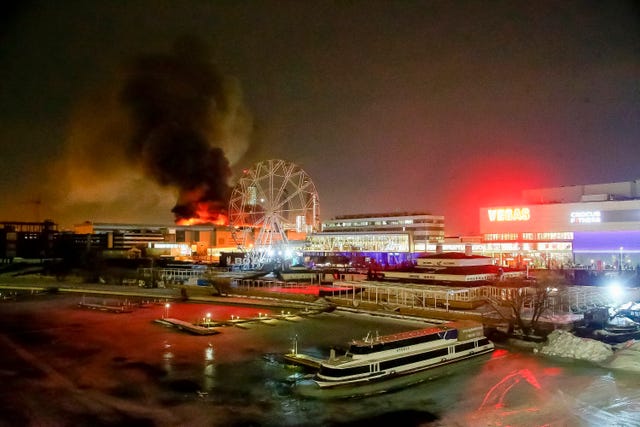
The attack, which left the concert hall in flames with a collapsed roof, was the deadliest attack in Russia in years and came as the country’s war in Ukraine dragged into a third year.
The Kremlin said that Mr Putin was informed about the raid minutes after the assailants burst into Crocus City Hall, a large music venue on Moscow’s western edge that can accommodate 6,200 people.
The attack took place as crowds gathered for a performance by the famous Russian rock band Picnic.
As Russia’s Federal Security Service reported 60 dead and more than 100 injured, some Russian news reports suggested that more could have been trapped by the blaze that erupted after the assailants threw explosives.
Health authorities released a list of 145 injured – 115 of them admitted to hospital, including five children.
Video from outside showed the building on fire, with a huge cloud of smoke rising through the night sky.
The street was lit up by the blinking blue lights of dozens of fire engines, ambulances and other emergency vehicles, as several fire helicopters buzzed overhead to dump water on the blaze.
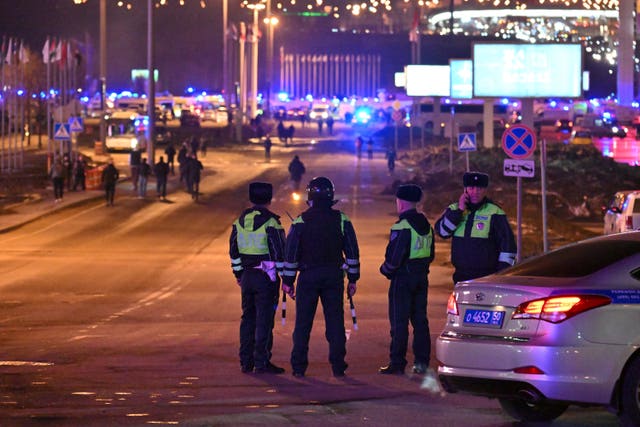
Russian news reports said concertgoers were being evacuated, but that an unknown number could have been trapped by the blaze.
The prosecutor’s office said several men in combat fatigues entered the concert hall and fired on concertgoers.
Repeated volleys of gunfire could be heard in videos posted by Russian media and on Telegram channels.
One showed two men with rifles moving through the venue.
Another showed a man inside the auditorium and saying the assailants had set it on fire, as gunshots rang out incessantly in the background.
Other videos showed up to four attackers, armed with assault rifles and wearing caps, who were shooting screaming people at point-blank range.
Guards at the concert hall did not have guns, and some could have been killed at the start of the attack, Russian media reported.
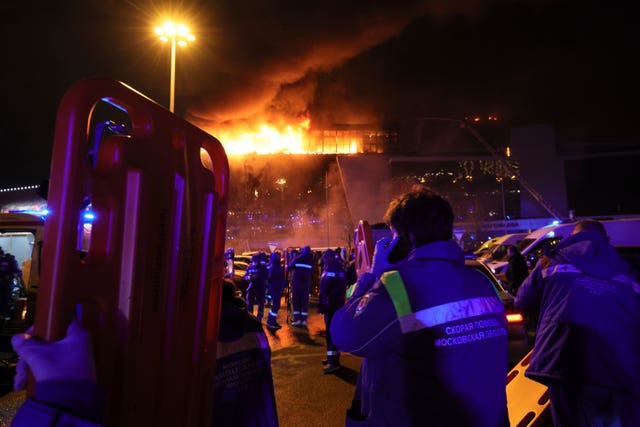
Reports said police patrols were looking for several vehicles the attackers could have used to escape.
In a statement posted by its Aamaq news agency, IS said it attacked a large gathering in Krasnogorsk on Moscow’s outskirts, killing and wounding hundreds.
It was not immediately possible to verify the authenticity of the claim.
Earlier this month, Russia’s top security agency said it thwarted an attack on a synagogue in Moscow by a cell of IS.
Russian authorities also said that six alleged IS members were killed in Ingushetia in Russia’s volatile Caucasus region.
It was not clear why the group, which operates mainly in Syria and Iraq but also in Afghanistan and Africa, would stage an attack in Russia at this time.
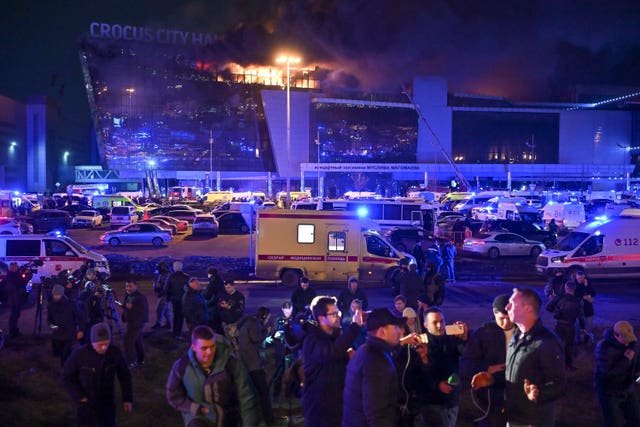
As the blaze raged, statements of outrage, shock and support to those affected streamed in from around the world.
Some commentators on Russian social media questioned how authorities, who relentlessly surveil and pressure Kremlin critics, failed to identify the threat and prevent the attack.
Russian authorities said security has been tightened at Moscow’s airports, railway stations and the capital’s sprawling subway system.
Moscow’s mayor cancelled all mass gatherings and theatres and museums shut for the weekend.
Other Russian regions also tightened security.
The Kremlin has not blamed anyone for the attack, but some Russian legislators were quick to accuse Ukraine of being behind it.
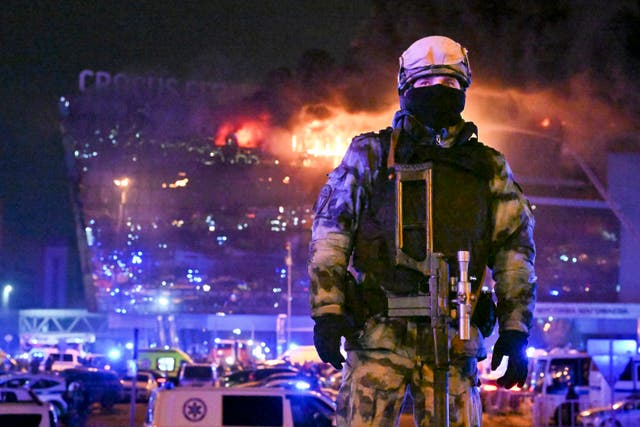
Mykhailo Podolyak, an adviser to Ukrainian President Volodymyr Zelensky, denied Ukraine’s involvement in the concert hall attack.
“Ukraine has never resorted to the use of terrorist methods,” he posted on X.
“Everything in this war will be decided only on the battlefield.”
John Kirby, spokesman for the White House National Security Council, said he could not yet speak about all the details but that “the images are just horrible. And just hard to watch”.
“Our thoughts are going to be with the victims of this terrible, terrible shooting attack,” Mr Kirby said.
“There are some moms and dads and brothers and sisters and sons and daughters who haven’t gotten the news yet. This is going to be a tough day.”
The attack followed a statement issued earlier this month by the US embassy in Moscow that urged Americans to avoid crowded places in the Russian capital in view of “imminent” plans by extremists to target large gatherings in Moscow, a warning that was repeated by several other Western embassies.
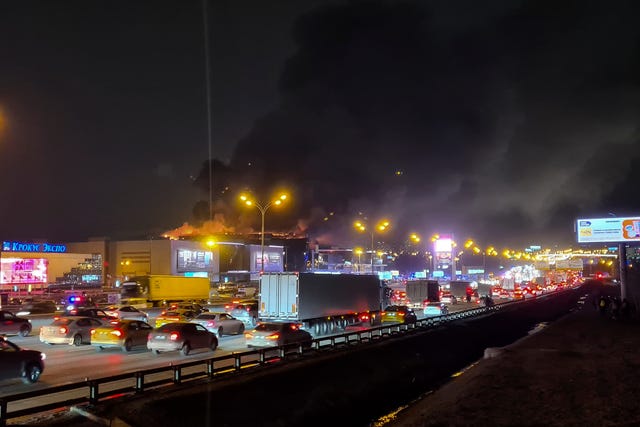
Responding to a question about whether Washington had any prior information about the assault, Mr Kirby responded: “I’m not aware of any advance knowledge that we had of this terrible attack.”
Mr Putin, who extended his grip on Russia for another six years in the March 15-17 presidential vote after a sweeping crackdown on dissent, earlier this week denounced the Western warnings as an attempt to intimidate Russians.
Russia was shaken by a series of deadly terror attacks in the early 2000s during the fighting with separatists in the Russian province of Chechnya.
In October 2002, Chechen militants took about 800 people hostage at a Moscow theatre.
Two days later, Russian special forces stormed the building and 129 hostages and 41 Chechen fighters died, most of them from the effects of narcotic gas Russian forces used to subdue the attackers.
And in September 2004, about 30 Chechen militants seized a school in Beslan in southern Russia, taking hundreds of hostages.
The siege ended in a bloodbath two days later and more than 330 people, about half of them children, were killed.






